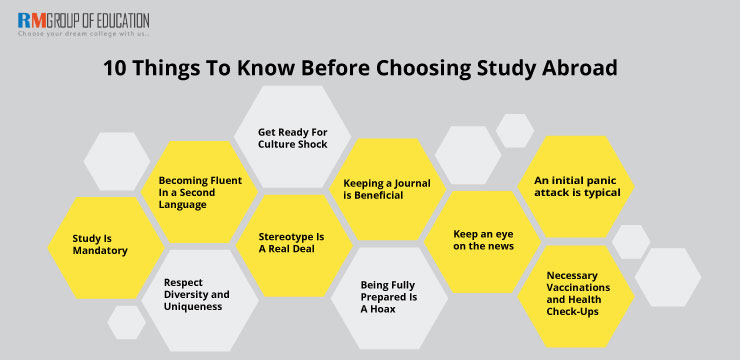10 Things To Know Before Choosing Studying abroad: Studying abroad is a dream for many, and it can be one of the most eye-opening and life-changing experiences. However, the process is not as simple as it seems. With thorough research, proper knowledge, culture shock, travel planning, and overall cost, studying abroad can be complicated if not done right. Let’s be honest; not everyone gives you the full picture of what studying abroad entails.
Studying abroad is a significant decision that goes beyond just attending classes in a different setting. Like the first day of school, it can be nerve-wracking to worry about fitting in, making friends, and adjusting to a new environment. Fortunately, studying abroad helps ease these concerns. The experience fosters new social skills, making you feel more comfortable and confident by the end of the semester. In short, we can say that studying abroad is an experience to advance your self-confidence. But worry not, as in this article, we will cover 10 Things To Know Before Choosing Study Abroad.
Subscribe to RM Group of Education Newsletter, Get Admission, Fees, Seats etc.
10 Things To Know Before Choosing Study Abroad
Studying abroad can be equally daunting and exhilarating for students choosing to study abroad. One may experience many emotions about leaving home country and everything they know, so don’t worry as the phase will pass. We have compiled things to know before studying abroad for students going to study abroad. Let’s take a look.

1. Study Is Mandatory
Studying abroad involves more than just exploring new places; academics are a significant part of the experience. Contrary to what movies and TV shows might suggest, students will be busy with college assignments and other responsibilities. While there will still be opportunities to enjoy the local culture and nightlife, academic success demands dedicated study to pass exams. To help students socialize and make friends, colleges often organize fresher’s parties.
2. Becoming Fluent In a Second Language
In popular study destinations such as the USA, UK, and other English-speaking countries, English is widely used for communication. However, in countries like Russia, Ukraine, Belgium, and Germany, students might encounter language challenges. Improving language skills requires dedicated study, consistent practice, and embracing mistakes, just like in a classroom. Immersing yourself in the new environment provides more opportunities to practice, but success ultimately depends on your commitment and effort.
3. Respect Diversity and Uniqueness
Students from diverse backgrounds and cultures travel abroad for their studies, encountering new living conditions, traditions, languages, social environments, and cuisines. Embracing this diversity can offer fresh perspectives and help in making new friends. Studying abroad provides a unique opportunity to experience and appreciate various cultures firsthand.
4. Get Ready For Culture Shock
There are several phases of culture shock, including the new relationship phase, the frustrating phase, the adjusting phase, and the acceptance phase. It is actual and unavoidable. Even homesickness is natural when you are distant from home in an unfamiliar setting. Feeling homesick and going through culture shock is common and can be easily handled by interacting with others, exploring new surroundings, etc.
5. Stereotype Is A Real Deal
Stereotypes can often oversimplify things, like assuming Italians eat pasta all the time or believing French people only drink wine. These ideas come from stereotypical views, which can be either amusing or hurtful. When you’re abroad, people might stereotype you based on where you’re from. Instead of getting upset, use these assumptions as a way to start conversations and introduce your culture to others. It’s a chance to break stereotypes and share the richness of your background.
6. Keeping a Journal is Beneficial
It’s essential to document your experiences while studying abroad to cherish them for a lifetime. These priceless moments are worth remembering, and writing them down ensures they stay with you forever. This record will be invaluable whenever you feel nostalgic.
7. Being Fully Prepared Is A Hoax
No matter how much time you spend researching, there will always be some details you leave out or can’t anticipate. Enjoy the surprises as they come and find a way to persevere through trying circumstances.
8. Keep an eye on the news
Stay informed about changes in the economy, transportation, politics, or health crises in your study-abroad destination. While major disruptions can happen, try not to panic over minor events. Many popular study-abroad locations may experience economic or political issues, so be prepared to adapt. In the worst-case scenario, border closures could delay your program. Having student travel insurance can help protect you in these situations.
9. An initial panic attack is typical
Feeling nervous on your first day is normal, especially since you’re in a foreign country and far from home. However, this feeling will fade as you start meeting new people.
10. Necessary Vaccinations and Health Check-Ups
Your physician might recommend taking a vacation and can provide guidance on staying healthy while travelling. Contact your health insurance provider to arrange for your medications in advance and inform them of your travel details, including the destination and duration




